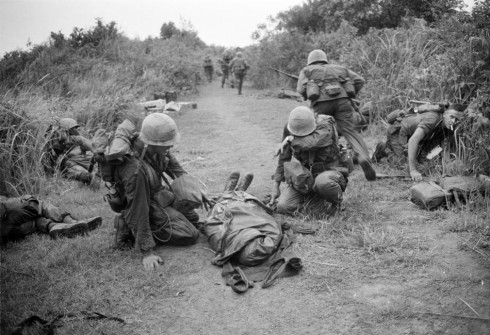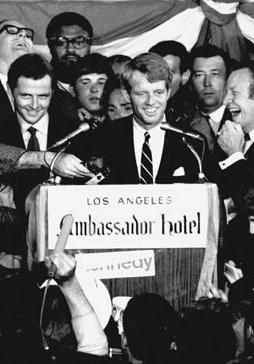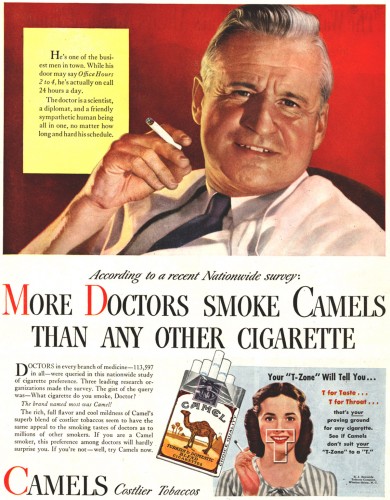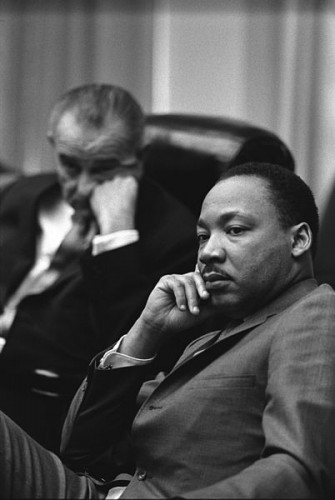The Final Chapter Of Umberto Tosi’s Novel, “Our Own Kind”
(Umberto Tosi, author of Ophelia Rising, was an editor and staff writer for the Los Angeles Times from 1959-1971.)
15. MAKEDA’S ARC
Makeda rips a half-typed sheet from Benny’s clunky Underwood and crumples it into a over-filled wastebasket by the kitchen table. “I can’t write about this shit!” She hobbles to the small fridge, still using a crutch. Ben has stocked it with snacks, milk and Keesha’s mini-cartons of juice. She finds some leftover takeout chow mien from the previous night, and takes to it, cold. She’s healing, but it still hurts to move around. She’s not that hungry, but if she eats she can take another codeine and mellow out. That won’t help the writing.
It’s a Saturday. Benny has taken Keesha and his own two daughters to Santa Monica pier for a few hours. He’s been a brick, but she wishes he wouldn’t hover around her so much some time. I still don’t know where we’re going with this, but it feels right. Up until last year we could have been jailed for getting married in some states. The Supreme Court ended that, and the bigots are saying it will end civilization as we know it, mixing the race. We can get married in Virgina, but fucking Nixon’s probably going to be President now. It’s sex, drugs and rock’n’roll out on the Strip, and cops still killing black folks down on Crenshaw. Forgetting doesn’t change anything. But does it really matter anymore? Not that Benny and I are talking marriage or anything like that. Don’t get me wrong. Okay, maybe I protest too much. Read more
A New Chapter In Umberto Tosi’s “Our Own Kind”
By Umberto Tosi
(Umberto Tosi, author of Ophelia Rising, was an editor and staff writer for the Los Angeles Times from 1959-1971.)
CHAPTER 14: CRY ‘THE COMPASSIONATE COUNTRY’
Benny drifts through the restless, election night crowd packing the Embassy Ballroom at the Ambassador Hotel on Wilshire., hungry for a big win. Everyone is jazzed. He should be swept up in it, but his mind is on Makeda. Waves of hoopla roll outward from strategically placed TV monitors where spectators bunch up, obliviousness to the drab-carpet, commercial ordinariness of their surroundings. Not much glamorous about this spot now but the famous name. The cheering grows more ebullient with each morsel of good news as precincts report.
Drinks overflow; there is too much smoking. It’s been only a hard-to-believe two months since Martin Luther King was gunned down in Memphis – with his killer or killers still unnamed – and it has seemed an eternity of despair for most in this crowd. The days of dysfunction stretch back way longer, of course, with the Vietnam War growing ever bloodier while the bright triumphs of the civil rights movement and the War on Poverty gave way to the recalcitrant realities of inequality, racism and urban decay. Now some tangible measure of hope for a real shift had seemed about to arrive out of the depths. The good news coming from the TV sets seemed almost alien. Read more
Umberto Tosi’s ’60s Yarn Continues With Chapter 13; Shotgun Psychos
(Umberto Tosi, author of Ophelia Rising, was an editor and staff writer for the Los Angeles Times from 1959-1971.)
Detective Sergeant Jacob Imhoff was just another burned out cop, tough-but-fair, maybe a decent guy, hard to read. Roy could see all that – and knew what else.
They sit opposite each other in a booth at the back of Clifton’s Cafeteria on Broadway near Sixth Street, a place with a history, catering to mixed downtown clientele of drifters, downtown workers and tourists. It’s unfrequented by cops or newsmen, which makes it a good spot to meet. Roy examines Imhoff’s fleshy face for clues. With his graying crew cut and massive shoulders, Imhoff resembles an ICBM emerging from its silo. Imhoff plays off of his bulk and a striking homeliness that he’s made into an asset, alternating between King Kong and the Jolly Green Giant, menacing or jovial, always imposing. Read more
CHAPTER 12 “RING AROUND THE ROSEY” FROM UMBERTO TOSI’S NOVEL, “OUR OWN KIND”
(Umberto Tosi, author of Ophelia Rising, was an editor and staff writer for the Los Angeles Times from 1959-1971.)
Benny’s been flat as a warm soda since he lost the custody case. Better if he’d kick in a wall, or go on a toot, howl at the moon. At least talk about it. He’s no good to anybody this way – especially himself.
I feel bad for him, but I’m not taking it on. I got enough on my back. I told him he’s got to get hold of himself. He looked hurt. “Get hold of yourself, Benny, then maybe I’ll hold your hand, and you mine again.”
He looked up, pained. “What did I do wrong?” That’s his tune now.
“You want me to tell you everything is okay, when it isn’t? You know most everything is fucked – that’s life as usual – and you already know you’re okay – most of the time, anyway, Ben. So, what else is there?”
It felt mean, talking that way, but he’s pushing me out, and probably doesn’t even know it.
“Not the end of the world,” I tried to tell him. “You just go back to being a weekend daddy.”
“It’s a sop. It won’t work. I’m sick about those kids living in crazy town with their mother and her whole boozing, back-biting clan, and not being able to do a damn thing about it” he rambled. I’ve heard it all before.
“You’re still around for them, Benny, and you do more than most.” I made one more try at consolation.
“What’s the good in it?” he says.
“Now you’re crying in your beer. It’s not becoming, Benny.” I’m exasperated. This is tearing me up, and I’ve got Keesha to consider. I told him it was best we put some distance between us for a while. I never moved in completely, anyway, and thank the Lord and my good sense for that.
“I’ll just go back to my own place, Benny.”
“Ah, jeez,” he says, and I can see he’s breaking up.
“Our thing here was always temporary,” I said. “We agreed to that.”
Then started negotiating. He offered to get a bigger place that we could share. “I’ll pay for it,” he offered.
Wrong. “I don’t want you to pay my way, Benny.” Read more
CHAPTER 11 “TOKEN GESTURES” FROM UMBERTO TOSI’S NOVEL, OUR OWN KIND
(Umberto Tosi, author of Ophelia Rising, was an editor and staff writer for the Los Angeles Times from 1959-1971.)
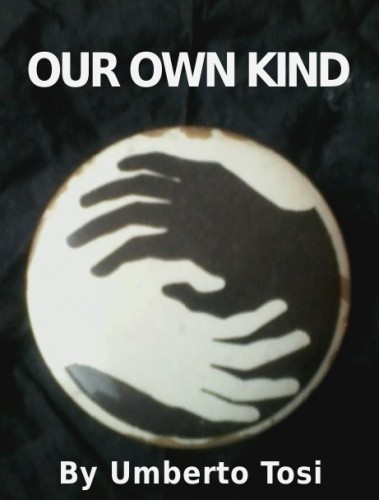 Roy Wolfe slides onto the barstool next to Benny and lights a Camel. “Gotta quit these things.”
Roy Wolfe slides onto the barstool next to Benny and lights a Camel. “Gotta quit these things.”
“More doctors smoke camels than any other cigarette.” Gordon feeds the line.
“He’d walk a mile for a Camel,” Benny cues off the ad that actually had just flashed on the muted bar TV, and bums one off Roy.
Roy acknowledges Gordon with a sidelong glance, elbows Benny, gives him a fag and lets him light up off of his. “Fraternizing with the enemy again, Benny?” Smoke envelopes them in a blue-gray twilight like doomed doughboys in World War I trenches.
Camel Cigarette ad from the period, with slogan quoted in Nino’s text
Roy reminds Benny of a younger Nat King Cole, with high forehead, sculpted cheekbones and an easy, kind of sexy smile, but a gravelly voice. He doesn’t trust himself to say that to anyone, for fear it will sound like he thinks all black people look alike.
Maybe. Benny is white, after all – a whiter shade of pale. Procol Harum’s pseudo-psychedelic one-trick hit gives Benny a contact high and a case of hives, because he has to grit his teeth and give a shit-eating smile whenever people mention the title as a cool way of letting him know they notice he’s an albino.
“Yeah? Well then, where are my 16 vestal virgins?” Read more
Umberto Tosi’s Novel “Our Own Kind”Continues With Chapter 10, “Gordon’s Knot.”
(Copyright © 2015 by Umberto Tosi, all rights reserved.)
—————
Umberto Tosi‘s latest novel is Ophelia Rising, a literary historical novel about Shakespeare’s fair maiden before and after Hamlet.
GORDON’S KNOT
The social worker doesn’t make eye contact. She squints slightly through wire-rimmed glasses as she puts her ballpoint pen to the sheet of paper on her official clipboard, her shoulders hunched as if somebody might peek. She’s only slightly plump, slightly fortyish, slightly rouged, all neutral in a gray suit and sensible shoes, except for her dyed reddish hair that needs a touch-up. She clicks off questions in with a lets-get-it-over flatness, without follow-ups. Benny gets that Ms. Gray Suit already made up her mind.
Benny tries to nuance and elaborate his responses, but she’s having none of that. He feels impatient too, thirsty for a martini at the Dog, where he would be, having taken the rest of the afternoon off. Ms. Gray Suit has him cornered in a tight, windowless bleach-lit meeting room in the basement of the courthouse, a good place to get the third degree . He had hoped she would come to his home – which I had made spotless for the occasion – with his daughters at play in the yard and all demonstrably right with his parent world. Turns out the social worker had already gone by his daughter’s school, and met with them privately in the principal’s office. Ben steams himself up imagining Gray Suit putting his girls on the spot about whether they would like to live with neurotic, albino daddy or manic-depressive, vodka-orange-juice tippling mommy. Read more
Tosi’s Novel “Our Own Kind” Continues With “The Prophet Of Spring Street”
 By Umberto Tosi
By Umberto Tosi
(Copyright © 2014 by Umberto Tosi, all rights reserved.)
—————
Umberto Tosi‘s latest novel is Ophelia Rising, a literary historical novel about Shakespeare’s fair maiden before and after Hamlet.
7. THE PROPHET OF SPRING STREET
Here he comes, the prophet of doom. His bombast echoes off the bland glass and concrete of civic center. Shambling forward, hollering Gospel, as he hears it in his head, he parts lunch-hour pedestrians like the Red Sea. Every damn day. His booming could crack tree trunks:
“HELL! You’re all gonna go to H-E-L-L-! Hell! Hell! You’re goin’ to H-E-L-L-!”
Over and over, louder and louder until he arrives like a bad squall, spiral-eyed, tall and gaunt, with long blondish hair and beard bristling. He always wears a plus-size, cream brassiere like a helmet, D-cups akimbo like Viking horns, with the straps dangling, as he strides forward as if into a stiff wind, to the syncopated cadence of his remorseless chant:
“Ha-hell, ha-hell. You’re all goin’ to ha-hell, damn-a-nation and-a h-hell. You’re all-a-gonna-go-ta h-e-l-l-l-l!”
He’s a standing joke at the first-floor magazine office, where they can hear him bunkered from his midday, holy barrage inside the massive gray walls the old Times building. On this particular day, however, the hellfire rant stops suddenly. Down on the first floor, Benny sees Preacher Man’s face flush to the pane nearest his and Makeda’s desks. Preacher Man cups his hands against the glass and peers at them with Apocalypse eyes. His face floats disembodied against the dark glass like Jesus on the Shroud of Turin. His lips move soundlessly. Read more
Onward With Umberto Tosi’s “Our Own Kind,” Chapters 5 and 6
(Copyright c 2014 by Umberto Tosi)
5. WAR AS A WAY OF LIFE
Six weeks later, just as things seemed to settle down, Sid phones and tells Ben that Lori is back in L.A., like nothing happened.
“News to me.” Ben tries to sound nonchalant. He hadn’t heard anything from Lori, nor had she phoned the girls. “It’s like we severed diplomatic relations, seeing as we’re at war.”
Ben hears Sid’s secretary say something in the background. Then Sid cups the phone and all Ben hears are muffled sounds.
“Sorry about that.” Sid is back. “Listen. Now her counsel claims that your ex is fit as a fiddle. He’s accusing you of stealing the kids.”
“… But you told me…”
“Hey. Don’t worry about it kid. We’re on legal ground here.”
“Yeah. And there are no earthquakes in California”
“Her attorney is just trying to make a case so they can bargain.”
“What about her mental illness. She’s been in a psych ward for weeks. Can’t we show that?”
They’re claiming that she was just recovering from exhaustion.”
“I wish. You know that’s not true. What about the hospital records?”
“That’s just it. We would need a court order to get them. Patient privacy and all that.”
“So? Get one.”
“Not that easy. But we can threaten to get one as a bargaining chip.”
“Franz Kafka could have done something terrific with this. Me? I’m not so sure.”
“They’re demanding that you bring the kids back to her forthwith.”
“Just like that? Ping-pong with children? I don’t even know where she’s living now, or what condition things are in. Her old apartment was a sty. Pure chaos. Beer cans and cigarette butts: early saloon décor.” Read more
Two More Chapters Of Umberto Tosi’s Novel, “Our Own Kind.”
The Open Road–Route 66, in New Mexico
by Umberto Tosi
3. MAKEDA
We’re friends, Benny, that’s all. I made that clear. I said it for myself, much as him. I’m on a diet – no more men. Not till I learn better, not till Keesha grows up, or both.
“Sure thing, Makeda.,” he says. Cheerful, but I can see his disappointment.
Now he lays back just enough to make it safe for us to flirt. “I know you love me,” he say, teasing, offhand, grinning.
“As a friend,” I add, too quickly.
Benny is one of those kind who gets away with all kinds of shit by being odd. He doesn’t have to try very hard, with that albino look – not creepy. More like marble come to life, but no Greek god – too skinny. Skinnier. The shades help. Then he dresses cool – not hip, not trying too hard. I won’t say he’s handsome, but those crystal blue eyes hold me.
Right off, I noticed that Benny never oob-eyed my tits like a lot of men, no sneaky peaks. I would catch him if he did, like the those jerk-off white boys since fifth grade back home who I could tell thought black girls easy. Read more
Siren Song, Chapter Two, Umberto Tosi’s “Our Own Kind”
2. SIREN SONG
Six months earlier. New Year’s day.
Ring, ring, ring! Goddammit! Who’s calling this early? It’s barely light. The phone won’t stop hurting his head. It pings merrily off the bare hardwood floors and sparse furnishings of Benny’s rented cottage.
The cottage was a real find, just below Mulholland Drive– perfectly in the path of brush fires and mudslides. Chipped, Spanish stucco and red tiles, once a guest house on an estate that belonged to Charlie Chaplin, now subdivided, a cozy three-bedroom. Benny hears the rain between rungs – staccato against his windows. They said ’68 would be wet. That’s L.A. – drought or downpour, fame or famine, and junk food feasting. Read more


